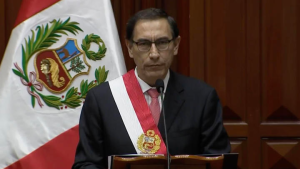Carlos Sánchez Berzaín
march 28, 2018
 (Interamerican Institute for Democracy) In Peru Pedro Pablo Kuczynski (PPK) was elected in a second round of voting as a weak president, riding on the premise to prevent, at all costs, Keiko Fujimori’s election to the presidency. His election resulted in a fragile government with a minority of seats in congress, functioning within a very bureaucratic presidentialist system. The forum of Sao Paolo with Lula da Silva at its head and roughly 15 construction companies, amongst which Odebrecht stands out, have left their stain of corruption throughout the Americas. These two elements; ungovernability and corruption, have just led to PPK’s demise, but at the same time have shown a democracy that works in Peru.
(Interamerican Institute for Democracy) In Peru Pedro Pablo Kuczynski (PPK) was elected in a second round of voting as a weak president, riding on the premise to prevent, at all costs, Keiko Fujimori’s election to the presidency. His election resulted in a fragile government with a minority of seats in congress, functioning within a very bureaucratic presidentialist system. The forum of Sao Paolo with Lula da Silva at its head and roughly 15 construction companies, amongst which Odebrecht stands out, have left their stain of corruption throughout the Americas. These two elements; ungovernability and corruption, have just led to PPK’s demise, but at the same time have shown a democracy that works in Peru.
With the revelations of the “Lava Jato” corruption scheme, almost all of Latin America’s governments have been implicated. Odebrecht is one of the Brazilian companies implicated in the Forum of Sao Paolo’s criminal network implemented by Lula da Silva with the dictators Fidel Castro and Hugo Chavez with the payment of millions of dollars in bribes. Yet to be investigated are contracts, construction projects, overpricing, bribes, and corruption of the rest of the suspected Brazilian construction companies such as; OAS, Queiroz Galvao, Andrade Gutierrez, Camargo Correa, Mendez Junior, UTC Engineering, and others.
The reaction from those countries implicated in the “Lava Jato” scandal has been of three types:
- Fight Against Corruption. Countries with democracy, separation and independence of the branches of government, existing “Rule of Law” and freedom of the press, have opened vigorous investigations and have decisively moved forward. Brazil has impeached and removed President Rousseff, has sentenced Lula da Silva to jail, along with Marcelo Odebrecht, and continues to prosecute others. Peru has prosecuted two former presidents and others, has jailed Ollanta Humala and his wife, is looking for Alejandro Toledo to be charged for corruption, and has just recently forced PPK to resign from the presidency so that he can be prosecuted.
- Partial or High-Level Cover-up. In those countries wherein those implicated control from the executive branch –even if relatively- the legislative and judicial branches, they have conducted partial investigations covering up the main culprits such as; presidents, former presidents, ministers, or other high-level officials, attempting to “sweep under the rug” and charging “escape goats” of lesser rank, as has been denounced and we suspect has happened in the Dominican Republic, Colombia, Panama, Mexico, now Ecuador with Lenin Moreno, and others. In these countries, there is still hope that those implicated will be punished.
- Total Cover-up. In countries controlled by Castroist Chavist dictatorships, wherein there is no separation and independence of the branches of government, where there is no Rule of Law, no freedom of the press, and justice is but another tool for the regime, such as; Cuba, Venezuela, Bolivia, Nicaragua, and Rafael Correa’s Ecuador, all investigations have been covered-up, they keep them concealed, and there is impunity. Corruption has been denounced with Odebrecht’s construction project as the Port of Mariel in the hundreds of millions of dollars, but the Cuban dictatorship covered this up and remains silent. In Bolivia, Evo Morales and his regime cover-up denounced corruption with OAS, Queiroz Galvao, Andrade Gutierrez, and others that even led to the tragic death of the Director of the National Roadway Service, Mr. Jose Maria Bakovic.
To conceal the corruption that has involved the highest levels of government, you need to have lots of power and since those 21st Century Socialism’s dictators totally control all power, for now it becomes relatively easy for them to do so. But their nation’s people known that corruption is essential for their regimes and are now fighting against it.
A minority President, such as PPK, with a very weak representation in congress, with a strong opposition against him, functioning within a very bureaucratic presidentialist system is doomed to not serve out his term. In my article of 30 May of 2016, under the heading “Peru between Keiko Fujimori and ungovernability” I had predicted PPK’s government to be a resounding failure due “to the lack of objective conditions of governance”. This situation aggravated by falsehood and corruption, is unsustainable as the facts have shown.
A serious crisis of ungovernability, compounded by corruption, has been waded through without compromising Peru’s democracy. The good news is that Peruvian democracy does exist, it works, has shown to be institutionalized, has proven there is Rule of Law, and shows there is separation and independence in the branches of government. There were no rattling of sables; it was a show of civism.
Published in Spanish by Diario las Américas on Sunday March 25th, 2018
Translated from Spanish by: Edgar L. Terrazas, member of the American Translators Association, ATA # 234680.
 Carlos Sanchez Berzain Abogado | Estadista | Político | Politólogo
Carlos Sanchez Berzain Abogado | Estadista | Político | Politólogo
